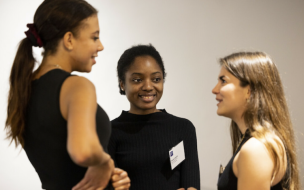The cryptocurrency is gaining ground at business schools, so much so that professors are bringing the concept into MBA classes.
The vision for bitcoin, the cryptocurrency traded through untraceable digital transactions, is starting to fade but business schools are slowly deploying the concept in their classrooms.Two leading US business schools are trialling bitcoin classes for MBA students, as the controversial currency has risen in profile in the wake of the financial crisis.
Duke University’s Fuqua School of Business will offer a new course on bitcoin in 2015 that is available to MBA students through its innovation and entrepreneurship initiative.
The program, called Innovation and Cryptoventures, will explore bitcoin’s disruptive technology and try to assess its implications on how business will be conducted in the future.
Business education is often focused on the past, said professor Campbell Harvey who developed the program. “My course is focused on the future,” he said in an interview BusinessBecause.
The program, which was capped at 36 students incluing law and computer science majors, is geared towards entrepreneurs, said professor Campbell.
“There are at least 500 bitcoin related start-ups with approximately 10,000 people working full-time,” he said. “I expect venture funding to double in this space in 2015.”
A list of topics compiled in the course document show that Fuqua will also focus on the bitcoin blockchain, the technology that allows ownership of a bitcoin to be transferred between users.
The blockchain has drawn interest from investors who believe it could be expanded to transfer other financial assets, with potential use in derivatives contracts and in the real estate industry.
Professor Campbell said that any simple financial contract can be included in the blockchain. “This decentralized technology has the potential to threaten centralized technologies like stock exchanges,” he added.
Fuqua follows New York University’s Stern School of Business, which has previously taught a class that studies bitcoin and other alternative payment mechanisms.
Offered jointly by Stern and NYU’s law school, the course covered topics such as bitcoin as an investment and the trading of bitcoin, and the legal and regulatory treatment of the currency. It ran from September to December 2014.
“We are exploring a new technology that raises interesting questions about the nature of money and how that is likely to change in the future,” said David Yermack, a finance professor at Stern who created the course with law school professor Geoff Miller.
The class, which had 35 students, drew an audience of entrepreneurs, future attorneys, regulators and investors. Two thirds of the cohort was from the law school, but David said that any business school student should be aware of bitcoin.
“It also should help stretch their imaginations so that they think of new products and services for their customers," he added.
Bitcoin has made its way into business schools in other ways. James Angel and Doug McCabe, professors at Georgetown University’s McDonough School of Business, published research into the ethical considerations behind bitcoin in January.
Doug, a professor of management, said that bitcoin can be used for “evil purposes”.
He compared the currency to medical products. “Painkillers like Oxycodone have a serious potential for abuse, but also important medical uses as well,” he added.
Schools including Berkeley’s Hass School of Business, Harvard Business School, USC’s Marshall School of Business and Glasgow’s Adam Smith Business School have held large bitcoin events on their campuses.
USC drew the attention of speakers Travis Skweres, chief executive of CoinMkt, which allows users to buy and sell bitcoin and other virtual currencies, and Micah Winkelspecht, CEO of bitcoin wallet solution BitVault, also known as Gem.
The Massachusetts Institute of Technology will in May this year hold another Bitcoin Expo, which last year drew more than 400 students.
2015’s speakers will include Gavin Andresen, chief scientist at the Bitcoin Foundation, and Charlie Lee who created Litecoin, one of the most popular alternatives to bitcoin.
Some stores on MIT’s campus also accept bitcoins as payment. Other universities, such as the UK’s University of Cumbria, even accept bitcoin as payment for tuition fees.
But it is the controversial nature of bitcoin that is drawing the most interest from the academic community.
Students at Trinity College Dublin, for instance, are researching how to make bitcoin more transparent, to reduce the risk of fraud and to make it appealing to businesses.
Donal O’Mahony, Trinity professor of computer science, said that the team wants to develop systems that give regulators visibility on the flows of bitcoin in the same way that central banks do over traditional currencies.
Like a growing number of professors, for Donal this is just the beginning.
“Trinity College and its students will be keeping a close eye on Bitcoin from now on,” he added.
Student Reviews
Duke University Fuqua School of Business
Supportive atmosphere
The professors at Duke university exhibit exceptional commitment to the success and well-being of their students by ensuring their academic growth and fostering a supportive social atmosphere. Moreover, the entire community is recognized for its amicability and inclusiveness.
Diversity
The people or the students are without a doubt Duke's greatest asset. While all students are driven to succeed, they are also enthusiastic about a variety of hobbies. You run across a huge lot of diversity. It is the ideal example of a school with well-rounded students and the ideal balance of campus life in a metropolis.
Happy to school
All I could ever hope for is Duke University. That really epitomizes the "work hard, play hard" philosophy that elite colleges frequently pursue. Even though you'll have a lot of schooling to complete over the week, it's simple to keep focused because all of your friends are putting in similar amounts of effort. Many events taking place on and around campus on the weekends provide a great way to unwind. The combination of demanding academics and traditional college fun strikes the perfect balance.
Good schooling
Living, eating, learning, and developing who you want to be as an adult are all fantastic at Duke. I participated in student athletics, and I couldn't have asked for a better interaction with the faculty and other students. I appreciate all of the help I get from the Duke community more than anything. Furthermore, the teachers take the time to get to know you, and the lectures are diverse and demanding (if you do the same). I'd give it a 10 out of 10.
Beautiful School, Nice Classes
DU remains one the greatest and best universities that I have ever stepped in. The school is beautiful and neat. The classes are spacious and also very nice. I enjoyed attending my Lectures in those lecture halls. I also loved the Lecturers because of the good work they did. The university also has very good dorms that are given to students on first come first serve basis and they are affordable
Amazing experience
I received my B.S. in Biology and B.A. in Global Health with a minor in Chemistry from Duke University. I was able to grow as a student, scientist, and global health advocate with the help of my friends, professors, and other mentors I met along the way. A lot to learn if you look and ask, a great place to learn for those who want to learn.
whirlwind of growth and change
An amazing 2 years, with covid and everything else happening Duke has been a place of growth for me. The courses , classes were one of a kind, online and on campus. But the valuable lessons learned in the classes are irreplicable. The students are amazing here, so much diversity , I had no problem fitting in. The teachers are down right brilliant and so helpful. Don't be afraid to ask them anything. Graduated with my MBA with Duke and now my future awaits.
One of the best for Business students
Graduated with an MBA. The classes were very insightful and engaging. The staff are very easy to deal with. The teachers and students, are truly amazing people. Grateful to all the people I've met along the way at Duke. I've learnt a great deal that will help me in my future endeavors. The campus itself is a marvel, it is beautiful.
The university campus is awesome
I graduated with a masters degree in Religious Studies from Duke University. One thing I really liked about the university is its huge campus. It is spread in a large area with a lot of greenery and also have the facilities of reading rooms for single person also. My department building was very well taken care of. The library is immensely populated with books for all your needs. The faculty is very nice to students. The classes are equipped with latest technology to cater the needs of students. The University also provides room rentals for international students. They are very well maintained and priority is given to the International students for a comfortable stay there. There are weekly events conducted by the University as well as Student clubs for the entertainment of students. Anybody can take part in them and show their talents. I enjoyed my degree and I graduated in 2021 and was very happy that I had graduated from a reputed University.
Program Flexibility and Vibrant Campus Life
Duke University is renowned for its rigorous academic programs and vibrant campus life. The university offers a diverse range of majors and research opportunities, supported by world-class faculty.
What I particularly liked about Duke was its strong sense of community and the wealth of extracurricular activities available to students. The campus is beautiful, with top-notch facilities and a supportive atmosphere that fosters both personal and academic growth.
Overall, I would highly recommend Duke University for its excellent educational offerings and strong alumni network. If you're looking for a place that challenges you academically while offering numerous opportunities for personal development, Duke is an excellent choice.








